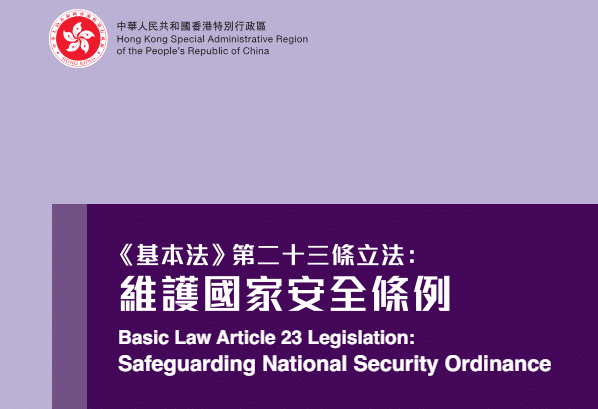“Article 23”: Another national security law passed
Hong Kong’s new Article 23 national security law came into effect on 23 March. The Safeguarding National Security Ordinance, its official title, is far broader than the 2020 National Security Law, imposed by the Chinese dictatorship. Whereas the Beijing-imposed law covered four types of offenses: secession, subversion, terrorist activities and collusion with external forces, the new law covers treason, insurrection, theft of state secrets, sabotage against public infrastructure including computer systems, and external interference in domestic affairs. It is a further sweeping attack on democratic rights, four years after the territory’s mass democracy movement was effectively crushed on orders from Xi Jinping. That move was heavily influenced by the accelerating US-China imperialist conflict.
Both the 2020 and 2024 laws are intentionally vague, giving the regime scope to improvise and expand its police state activities. The 212-page bill was rushed through Hong Kong’s CCP-controlled pseudo-parliament in just 11 days. Its provisions further undermine chances of a fair trial, abolish the right to a lawyer, and allow for detention without charge for 16 days compared to two previously. The law “punishes peaceful speech and civil society activism” says Human Rights Watch. Hence, the difference between Hong Kong and China is largely obliterated.
“Hong Kong is over”
Stephen Roach, former chief economist at Morgan Stanley, made waves with a Financial Times op-ed in February stating, “Hong Kong is over”. This provoked furious rebuttals from Hong Kong’s pro-CCP political elite. Among other things, Roach pointed out that Hong Kong’s stock market is lower today than it was under British rule, 27 years ago. Roach, until recently a “congenital bull” on China, lamented the Beijing regime’s failure to stimulate and end its economic slump.
A Hong Kong “run” Movement
Around 500,000 Hong Kong residents have left the territory since the beginning of 2021, seeking to escape from the CCP’s crackdown on democratic rights and political opposition. Hong Kong’s deep economic slide, linked to China’s downward gravitational pull, gives a further impulse to get out. This looks like a sister trend to mainland China’s “run” movement: an accelerating exodus driven by economic and political issues.
In 2022, Hong Kong recorded its highest net population loss and lowest birth rate since 1991. The city’s median age is now 46.3 from 31.6 then. Younger people are leaving, while the elderly are staying behind. Experts warn of an “irreversible tech brain drain” with severe economic consequences. Nice work, Xi Jinping!
Hundreds of unions disbanded
Trade unions have been among the biggest victims of the Chinese regime’s ruthless crackdown in Hong Kong. After Beijing’s National Security Law was imposed in June 2020, most of the pro-democracy trade unions closed down. Several union officials have been jailed awaiting trial on “national security’’ charges. These include Carol Ng, a former leader of airline cabin staff, and Winnie Yu, a nurse who founded the Hospital Authority Employees Alliance.
Under the new laws, their charges risk a life sentence. The white terror generated by this repression led to a wave of dissolutions. According to the Labour Department, 176 trade unions were de-registered over two years, 2021- 2022. The Confederation of Trade Unions (HKCTU), with 100 affiliated unions and 145,000 members, voted to disband on October 3, 2021, three decades after it was founded. When questioned by a UN committee in 2023, Hong Kong government officials falsely stated that trade union rights were “strong and intact as ever”. Their rationale is that pro-democracy trade unions were just a front for anti-regime “subversion” and even “foreign forces”.
Only the rabidly pro-CCP, reactionary and racist Federation of Trade Unions (HKFTU) still operates in Hong Kong – as part of the capitalist establishment. It is “fully supportive” of the repression.
Economy suffers a “lost half-decade”
Hong Kong’s GDP has shrunk in two of the past five years and is now smaller than it was in 2018. The intensification of repression under Xi Jinping’s iron rule has coincided with a worsening capitalist crisis, dragged down especially by China’s economic slump. The Economist magazine writes about a “lost half-decade” in Hong Kong. Being the “gateway to China” used to be the territory’s strongest card, now it’s a weakness. Hong Kong has lost out to Singapore, with more and more Western multinationals decamping to its “safer” environment (Singapore is another one-party dictatorship). Hong Kong’s GDP per capita was roughly the same as Singapore’s in 2003. Today, Singapore’s GDP per capita is nearly 70 per cent higher than Hong Kong’s. Housing prices have fallen 25 percent from their peak and Hong Kong’s stock market has been overtaken by India’s as the world’s fourth largest by market value.
Hong Kong’s demographic crisis is as bad as anywhere: Between 2018 and 2022 the labour force contracted by 6 percent. Despite its ultra-neoliberal policy environment, absurdly low company tax, and absence of trade union rights, foreign companies are leaving the city at an accelerating rate. Since 2019, the number of global companies with regional headquarters in Hong Kong has shrunk 8.4 percent, and their staff numbers have dropped 30 percent. The US-China Cold War further fuels this “decoupling”. The city’s wealth gap leaves Hong Kong’s poorest decile making 57.7 times less than richest. One in five Hong Kongers live in poverty.
Death of “One country two systems”
Counter-revolution has defined Hong Kong for the past four years, crushing the mass democracy movement that shook the territory. Xi Jinping’s repression was dictated by fear of revolutionary shockwaves spilling into China and the weakening of his regime in the global imperialist power struggle with the West. In the process, Hong Kong’s limited autonomy under the “one country two systems” formula has been effectively terminated.
For a decade or so after British rule ended in 1997, this relatively hands-off approach to ruling Hong Kong, entrusting the Hong Kong capitalists and assorted pro-CCP minions to keep control, suited Beijing. The dictatorship wanted good, above all profitable, relations with foreign capitalists. Hong Kong’s facade of democratic institutions was a useful tool to blunt international criticisms of CCP rule and sow the illusion that democratic change would be permitted, but only gradually and on Beijing’s terms. That proposition, like the CCP’s superficial “autonomy”, was never real. Democratic rights and local autonomy or self-rule can only be won by uncompromising mass struggle, not as rewards for “good behaviour” from the capitalists and their state.
Does mass struggle have a future?
For many years, Hong Kong’s people waged an inspiring mass struggle for democratic rights. This culminated in 2019, when almost one in three Hong Kongers joined demonstrations. Still, this gigantic movement was defeated. First by arriving at an exhausting stalemate, with repeated mobilizations failing to achieve a breakthrough against the government and state. Exhaustion turned to despair and fragmentation.
The 2019 movement shook Xi Jinping’s dictatorship, which feared it could spread to China. That would have changed everything. As we explained, only a movement to overthrow the capitalist CCP could avoid defeat and a brutal crackdown. A movement confined to one small territory, ruled by a much bigger state and regime, was too one-sided to succeed. The struggle was also fatally hampered by the lack of a party, workers’ traditions, mass organisations and a strong class consciousness that understood capitalism was the real enemy. The idea of solidarity with Chinese workers was sadly missing. To succeed in future a different – socialist – democracy struggle and leadership are needed.




